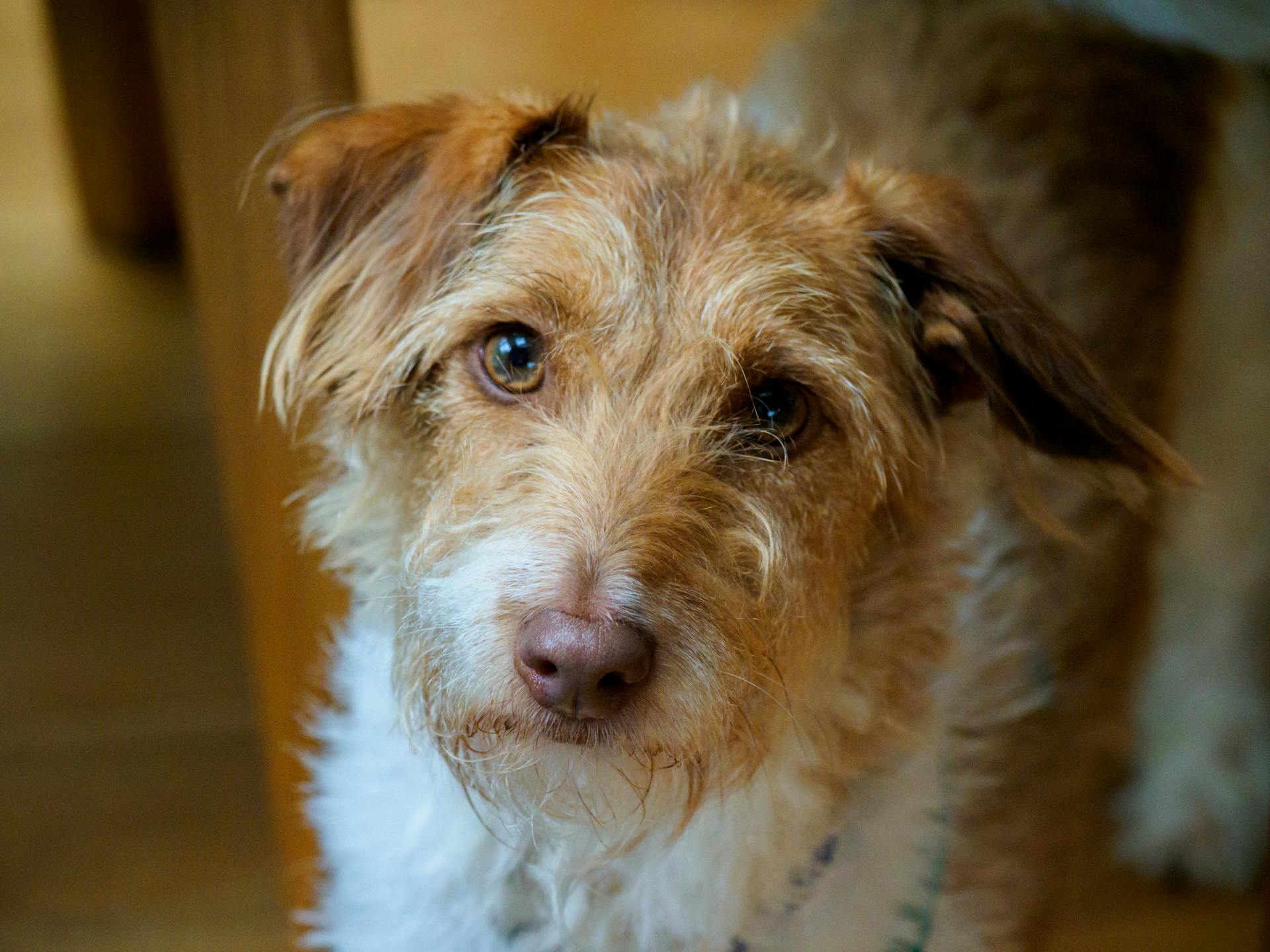
The Portuguese Podengo is a unique and fascinating breed. They are an ancient dog breed originating from Portugal.
This breed is highly energetic and requires regular exercise to stay happy and healthy.
Their short coats are easy to maintain, but they do shed heavily, especially during shedding season.
Quick Facts
The Portuguese Podengo is a breed that originated in Portugal, with a rich history that dates back to the hounds brought by the Phoenicians to the Iberian Peninsula. They come in three varieties: small, medium, and large, each bred to hunt specific prey.
Here are some quick facts about the breed:
- Size: 8-12 inches tall | 9-13 pounds.
- Lifespan: 12-15 years.
- Coat: Comes in two varieties: smooth, and long wirehaired. Colors include fawn, black/white, brown/white, and brindle.
- Exercise Needs: High
- Grooming: Minimal
- Health: Generally healthy, but potential for hip dysplasia, luxating patellas, and eye problems.
Fun Facts
The Podengo is sometimes called the Portuguese warren hound, which refers to their rabbit-hunting vocation.
Podengos have been around for centuries, with the term "podengo" dating back to at least the 1500s in Portugal when it was used to refer to pack-hunting dogs.
The American Kennel Club (AKC) recognized the pequeno as a separate breed from the medio and grande in 2008.
However, several groups and countries, including Portugal, consider all three sizes to be the same breed.
The Podengo has the distinct honor of being the symbol of the Portuguese Kennel Club, one of 10 national dog breeds in Portugal.
Worth a look: American Kennel Club Lancashire Heeler
Highlights

The Portuguese Podengo Pequeno is a lively and intelligent breed that's sure to capture your heart.
Their average size is 8-12 inches tall and 9-13 pounds, making them a compact companion for city living or country adventures.
They're highly trainable with positive reinforcement, but early socialization is crucial due to their potential wariness of strangers.
This breed has a short, smooth coat that requires minimal brushing, making them a low-maintenance grooming option.
The Podengo's exercise needs are high, requiring daily walks, runs, and playtime to satisfy their hunting instincts and boundless energy.
They're naturally alert and may bark readily at strangers or noises, so early socialization and training are essential to curb unwanted behaviors.
Here are some key characteristics to consider:
Their lifespan is 12-15 years, and they're generally a healthy breed, but potential health issues include hip dysplasia, luxating patellas, and eye problems.
With the right care and attention, the Portuguese Podengo Pequeno can make a wonderful companion for active families or individuals.
Physical Characteristics
The Portuguese Podengo Pequeño has a distinctive wedge-shaped head that tapers toward the tip of the nose and a straight muzzle.
They come in a small size, typically weighing between nine to 13 pounds and ranging in height from eight to twelve inches at the shoulder.
Their coats are often light, medium, or dark yellow or fawn, but they may also be black or brown or have markings.
Size
The Portuguese Podengo Pequeno is a small breed, typically weighing between nine to 13 pounds.
Their height at the shoulder can range from eight to twelve inches.
You can expect them to be slightly smaller or larger than this average range.
Their compact size makes them a great fit for city living or apartments.
Distinctive Physical Traits
The Portuguese Podengo Pequeño's physical characteristics are truly unique. Their wedge-shaped head is a distinctive feature, tapering towards the tip of the nose.
Their straight muzzle is a key part of what makes their head shape so special.
Their coats come in a variety of colors, including light, medium, or dark yellow or fawn, and they may also be black or brown with markings.
For your interest: Bull Terrier Head Shape
Characteristics of the
The Portuguese Podengo is a breed that comes in three sizes: Grande, Médio, and Pequeno. The largest, the Grande, can reach a height of 55 to 70 centimeters.
The medium-sized version, the Médio, is slightly smaller, with a height of 40 to 54 centimeters. The smallest, the Pequeno, is a tiny dog, standing at just 20 to 30 centimeters tall.
All three sizes of the Portuguese Podengo have a similar coat, which can be yellow, fawn, or black. The head is wedge-shaped and pointed, with a muzzle that's slightly shorter than the top of the head.
The breed is known for its lively and curious character, making them great companions. However, they do have a strong hunting instinct, which needs to be satisfied through consistent training or dog sports events.
Here's a breakdown of the exercise needs of the Portuguese Podengo:
The Portuguese Podengo is a social breed that thrives on interaction with its pack. They need regular playtime with other dogs to stay happy and healthy.
Exercise and Training
The Portuguese Podengo Pequeno is an active dog that needs daily exercise. A brisk walk or a romp around a secure, fenced-in yard will keep them happy and healthy.
They're also natural athletes, excelling in dog sports like agility, obedience, and rally. This breed has a strong prey drive, so a spacious fenced-in backyard is ideal for channeling their energy.
Long daily walks are a must for this breed, and they should be taken seriously. If they get on the hunt, they're hard to stop, so a secure fence is a necessity.
Highly intelligent and eager to please, the Portuguese Podengo Pequeno is a quick learner. Short, fun, and reward-based training sessions will help them stay focused and engaged.
Early socialization is crucial for this breed, as it will help them grow into a well-mannered dog. Positive reinforcement-based training is the way to go, encouraging positive behaviors and ignoring negative ones.
A well-trained and well-socialized Portuguese Podengo Pequeno will be friendly toward strangers and other dogs, making an excellent family member.
Suggestion: When Will Shiba Inu Hit 1 Cent
Health and Care
The Portuguese Podengo is a relatively healthy breed, but like all breeds, they can be prone to certain health issues. Hip dysplasia is a common condition that can cause discomfort, pain, and arthritis, so regular veterinary check-ups and maintaining a healthy weight are crucial.
Their eyes are also susceptible to disorders such as progressive retinal atrophy (PRA) or cataracts, which is why regular eye examinations by a veterinarian are essential.
To manage and prevent hip dysplasia, maintaining a healthy weight through regular exercise and a balanced diet is key. A daily walk of at least an hour, along with active play sessions and shorter walks, can help keep your Podengo Pequeno in top shape.
In addition to regular exercise, daily dental care is vital for the Portuguese Podengo. Brushing their teeth daily with a dog-specific toothpaste can help prevent tartar buildup and keep their teeth clean.
To keep your Podengo Pequeno's nails in check, trim them regularly, ideally once or twice a month, to prevent them from getting too long.
You might enjoy: Hip Dysplasia Bernese Mountain Dog
Here are some common health issues to be aware of and screen for:
- Hip dysplasia: Canine hip dysplasia occurs when a dog's hip joint develops abnormally, resulting in a loose, unstable joint.
- Patellar luxation: This is a hereditary condition in which the dog's patella, or knee cap, moves out of its normal groove within the femur when the knee is flexed.
- Eye problems: A veterinary ophthalmologist will be able to check for signs of eye disorders including glaucoma, cataracts, and progressive retinal atrophy.
Nutrition and Feeding
The Portuguese Podengo Pequeno is a small breed with high energy, so it's essential to feed them a diet that's formulated for small breeds with plenty of protein.
You should stick to a regular feeding schedule and not leave food out during the day to prevent overeating and weight gain.
Limit their number of treats, as giving too many can contribute to obesity.
A high-quality, age-appropriate diet is crucial for this breed, so be sure to monitor how much they eat and reduce portions if they gain excess weight.
Portuguese Podengo Pequenos should be fed twice per day until they reach maturity, then can sometimes be fed once per day as adults after consulting with your veterinarian.
You can give them healthy treats, but keep them small if you notice any weight gain, and talk to your vet if you have any questions or concerns.
Following the manufacturer's recommendations for the amount of food is also important, as is observing a rest period after meals to prevent overeating.
Grooming
Grooming is relatively easy for Portuguese Podengos, thanks to their short coats. They don't require haircuts, which is a relief for busy owners.
Brushing them at least once a week will keep their coat looking its best. This frequency is suitable for both the smooth and harsh wiry coat varieties.
To prevent tangles in the wiry coat, routine brushing followed by a quick combing is a good idea. This will keep their coat looking healthy and shiny.
For the smooth-coated variety, an occasional wipe-down with a damp cloth is enough to keep them clean. This is a low-maintenance option for owners who don't want to commit to regular brushing.
Portuguese Podengos need periodic baths, about once a month, to stay clean and fresh. Be sure to comb out their coat after the bath if it's wiry.
Monthly nail trims are essential to keep your Podengo's nails in check. This will prevent overgrowth and potential health issues.
A fresh viewpoint: Shiba Inu $1
Weekly ear cleanings are a good habit to get into, especially for dogs with long or wiry hair. This will help prevent wax buildup and debris.
Daily teeth brushing is a must for all dogs, including Portuguese Podengos. This will help maintain good dental hygiene and prevent potential health issues.
Temperament
The Portuguese Podengo is a lively and intelligent breed that thrives on activity and mental stimulation. They love to please their owners and are highly trainable.
They are not overly aggressive, but they can be wary of strangers and will bark to alert their owners. If they feel threatened, they will defend themselves.
These dogs have a strong prey drive, which means they were bred to hunt and will chase small animals if given the chance. They need to be kept on a leash or in a securely fenced yard to prevent them from wandering off.
Despite their high energy levels, Portuguese Podengos can be content curling up for a nap after a burst of activity. They are loyal to their family members and make great companions.
Additional reading: Are Portuguese Water Dogs Good for First Time Owners
They are generally friendly and loving towards their owners, but can be reserved with people they don't know. With proper training and socialization, they can get along well in any type of household.
As a breed built for hunting, Portuguese Podengos are naturally alert and brave, with impressive scent, vision, and hearing abilities. They are quick learners and can work well in packs or alone.
Living with a Podengo
Living with a Podengo is all about giving them space to run and play. They're active dogs that thrive on exercise and mental stimulation.
They do well in homes with active families, especially those with kids, and a fenced backyard is a must to keep them safe. Without a barrier, they might follow their noses into trouble or chase small animals.
Portuguese Podengos are hardy and can adapt to various climates and terrains, but their fur needs special care - smooth-haired podengos do well in wet climates while wirehaired ones prefer dry, hot weather.
They can share a home with other dogs of similar size, but introducing them to smaller animals like cats requires caution to avoid mistaking them for prey.
Living Needs
Portuguese podengos are active dogs that thrive on exercise and mental stimulation, so they need plenty of space to run around and play.
They do well in homes with active families, including kids, and a fenced backyard is essential to keep them safe and contained.
A hardy breed, podengos can adapt to various climates and terrains, but smooth-haired podengos excel in wet climates where their fur dries faster.
Wirehaired podengos, on the other hand, are well-suited to dry, hot weather.
Podengos are social dogs that can share a home with other dogs of similar size, but introducing them to smaller animals like cats requires caution to avoid mistaken identities.
Children and Pets
Living with a Podengo means considering the needs of all family members, including children and other pets. The Portuguese Podengo Pequeno is a great companion for families with children of all ages.
However, it's essential to teach younger children how to approach and play with a small dog gently to avoid injuries. This breed can make great companions and watchdogs if handled properly.
Introducing a Portuguese Podengo Pequeno to other pets requires patience and careful socialization. Early socialization is key to a smooth introduction, and it's best if they get used to other pets from an early age.
Many Portuguese Podengo Pequenos get along well with other dogs and cats, but it ultimately depends on training, socialization, and a bit of luck.
Suitable Accessories
Living with a Podengo requires the right accessories to ensure their comfort and well-being.
A collar or harness with a lead is essential for walks and training.
A dog basket or dog mat can provide a cozy retreat for your Podengo.
Water and food bowls are a must-have for mealtime.
Tick tweezers are necessary for removing ticks from your dog's coat.
Claw clippers are required for regular nail trimming.
Mild dog shampoo is necessary for regular bathing.
A brush or comb, or a rubber curry comb, is needed for grooming.
Toothbrush and toothpaste for dogs are essential for oral hygiene.
A transport box is necessary for safe car travel.
Asking your vet is the best way to determine what should be included in a first aid kit.
Treats are a great way to reward your Podengo during training.
A clicker is a useful tool for training and communication.
Fetch toys are perfect for physical exercise and mental stimulation.
Intelligence games that utilize your Podengo's sense of smell can provide mental stimulation.
Frequently Asked Questions
Do Portuguese Podengo bark a lot?
The Portuguese Podengo is known for its alert barking, but it's not excessive, and they only bark to warn owners of suspicious activity. Their barking is a natural part of their loyal and protective nature.
What does Podengo mean in Portuguese?
The word "Podengo" translates to "rabbit hunter" in Portuguese. This name hints at the dog's original purpose and origins.
Is Portuguese Podengo rare?
Yes, Portuguese Podengos are a rare breed, particularly in the U.S. where efforts are underway to increase their numbers and preserve genetic diversity.
Is a Portuguese Podengo a good family dog?
A Portuguese Podengo can make a loving family dog, but they require attention and socialization to thrive in a family environment. With proper care, they can be a wonderful addition to a family with older children who can understand their independent nature.
How much do Portuguese Podengo puppies cost?
Portuguese Podengo Pequeno puppies typically cost between $1,000 to $2,000 from a reputable breeder, with prices varying depending on location and family history. Learn more about the factors that influence the price of this unique breed.
Sources
- https://dogtime.com/dog-breeds/portuguese-podengo-pequeno
- https://www.hundeo.com/en/dog-breeds/portuguese-podengo/
- https://www.wisdompanel.com/en-us/dog-breeds/portuguese-podengo-pequenos
- https://www.dailypaws.com/dogs-puppies/dog-breeds/portuguese-podengo
- https://www.thesprucepets.com/portuguese-podengo-pequeno-dog-breed-profile-4783579
Featured Images: pexels.com

